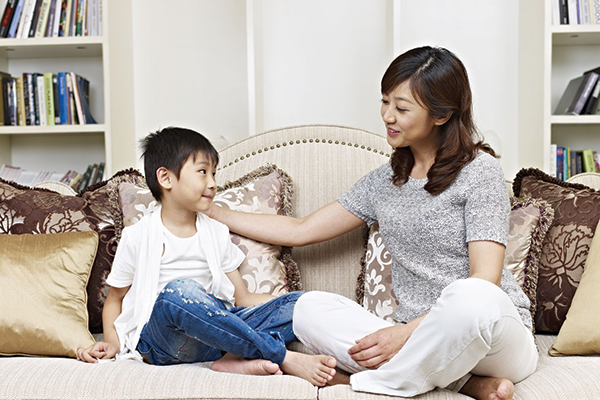Ways to Help Your Child Cope with Cancer in the Family
by Jennifer Gretzema, LLPC, NCC, SCL, CCLS
The diagnosis of cancer is often unexpected and daunting. However, many survivors and their families come to find a source of strength in the community they come to know, a sense of support in the guidance they receive, and a feeling of empowerment in the strides and discoveries made every day. These connections can be helpful not only to adults but to children as well. It is up to you to foster these connections with your child when someone in the family is diagnosed with cancer.
Developmentally, children have an egocentric view of the world. When someone in their life is diagnosed with cancer, they may feel they did something to cause it. They may also be dealing with silent worries about being able to catch a family member’s cancer. Adults in the child’s life can help assuage these fears by communicating with the child in an age-appropriate way.
After a cancer diagnosis in the family, a child’s questions and anxieties may feel all-consuming. A helpful metaphor to use when discussing feelings may be to equate these feelings with lava building up inside a volcano waiting to erupt. Teach them how deep breathing, sharing their feelings, and using art, music, and play to express themselves can help them calm the volcano inside.
Explaining Cancer Using Play
Most children digest information best through hands-on, developmentally appropriate play. For example, using a doll or stuffed animal, a child can role-play care of a central line (or some other aspect of treatment the adult is experiencing). You can ask medical staff for an infant-sized anesthesia mask, tubing for a central line, cleaning swabs, and dressings to aid in the role-play. What makes a child most anxious is that which is foreign and unknown. Sitting beside your child while they role-play and talking to them about cancer treatment will bring knowledge and comfort to you both.
Most children digest information best through hands-on, developmentally appropriate play.
As treatment progresses, people with cancer often begin to lose their hair. To prepare your child for this, you can talk about how cells are like building blocks in our bodies. Sometimes, these cells get sick. The chemotherapy medicine helps get rid of the sick cancer cells, but sometimes it gets confused and tells the healthy cells (such as the ones that build our hair) to go away too. Just make sure to draw the distinction between chemotherapy medicine and the medicine that a child takes for a cold, for example. Reassure your child that this won’t happen to them when they have to take medicine. You can also use the central line doll to role-play the hair loss – and regrowth – process. In fact, the doll can continue to be a supportive, educational tool for the child through-out the entire cancer process.
Establishing Routine in the Chaos of Cancer
Children thrive on predictability and consistency. Cancer may challenge their routine. Including children in making decisions about changes in routine that occur due to cancer will give them a sense of empowerment. For example, you can let them choose which relative to stay with if both parents are at the hospital. You may even want to record yourself reading a bedtime story for your child to play while you are in the hospital. This can provide a comforting ritual to your child, as well as serve as a point of connection between the two of you. You can also create a calendar so your child knows in advance when changes in the routine are going to occur. If possible, seek help from family members or friends to allow your child to continue their regular schedule and activities as much as possible. Establish a relationship with a school counselor or trusted teacher to help ensure your child is adjusting well at school.
A cancer diagnosis in the family can be overwhelming, especially for children. Partner with your community and support networks to provide a sense of comfort and connection for your child. Join your child in play, as this will allow them to process their thoughts about cancer and give you an opportunity to share your own. Recognize that resilience is made up of strong moments of triumph, as well as quieter moments of communion. Each of these holds power and significance.

Jennifer Gretzema is a certified child life specialist at the University of Michigan C.S. Mott Children’s Hospital in Ann Arbor, MI. She works with pediatric hematology/oncology patients and their families to provide psychosocial support during treatment. She also has a private counseling practice, Connections Counseling of Michigan, in Brighton.
This article was published in Coping® with Cancer magazine, March/April 2016.


